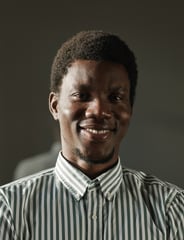
Exploring Disadvantage and Employability
Why should we consider Disadvantage during early stage recruitment decisions?
Why we've been exploring this
As with any early stage business, we've been doing a lot of market research to find problem-solution fit.
The problem of hiring diversity and inclusion is well documented, highly topical and generally has much more clarity. We all recognise there's a problem, and we see that companies and organisations are making concerted efforts to try and fix it (albeit with greater or lesser successes).
But this business is two-sided. EquAIty is effectively an intermediary between jobseekers and hiring teams - even if we're primarily an insight engine and not a more traditional jobs marketplace model.
So the other problem we've been validating in pursuit of problem-solution fit is: there are jobseekers whose disadvantage (disadvantage of any form) means they are ranked lower, excluded and/or rejected unfairly or prematurely within today's early stage hiring processes.
Who are the target types of disadvantaged jobseekers EquAIty is looking to help?
The value EquAIty creates for a jobseeker is the ability to showcase skills which are going to be overlooked and/or undersold by the traditional CV and application processes - in particular in the recruitment processes that constitute the early stages of shortlisting and candidate down-selection.
The kind of overlooked and undersold skills we're talking about here generally categorise into two buckets, respectively:
"Reactive" skills that are developed uniquely through disadvantaged circumstances - e.g. resilience, leadership, teamwork, empathy
"Proactive" skills that are proven through seeing the broader context of the person's circumstances - e.g. raw intellect, determination, nouse, resourcefulness
Let's clarify what we mean by Reactive skills
With Reactive skills, it's typically easiest to consider the extremes of disadvantage first - so for example, people who have faced severe circumstances like losing a parent during childhood, or caring for a terminally sick spouse or child, or being the victim of abuse. All of these scenarios will have created the opportunity to choose to develop skills that are applicable in the workplace - like empathy, resilience, leadership and teamwork. Someone who has been personally battling cancer might have set up and launched a successful charity while sick - proving business acumen, organisation skills and leadership, even during illness.
But it's important to also consider that there is a full spectrum of disadvantage that can directly contribute to the development of employable skills - from the very extreme to the much less extreme. Disadvantage that isn't so obviously severe, but that directly impacts the day to day lives of people, can have a profound effect on the mindset, beliefs and skills of those who experience it - often in a very positively employable way.
Examples of Reactive skills:
The friend of yours who privately experiences acute pain in relation to an incurable illness every day has had to develop stamina, self-control and a positive mindset just to operate 'normally' amongst colleagues in their workplace.
The colleague of yours who is dealing with an emotionally unstable relative who might wreak havoc one morning before work - has already learned how to maintain a professional demeanour in stressful situations.
The tall black man joining your elevator one evening has learned to smile at you as he walks in, demonstrating acceptance of and empathy towards the need to combat any negative stereotype you may have been exposed to - even though it isn't fair for him to have to do so, at all.
You're running late, but the woman behind you in the coffee queue is even later because she had to sort out a problem at her child's nursery and also buy some emergency sanitary products before she could head to work this morning - but a long time ago she learned to plan ahead with work and already did her prep for this morning's meetings last night, so her delay will cause no issues.
Those are all Reactive skills, because they're being developed as a result of something specific happening to that person.
Let's clarify what we mean by Proactive skills
Proactive skills, on the other hand, are proven when an individual achieves more in given circumstances than others achieve in those same circumstances. And this is important because the driver for that individual achieving more is coming from within that person - which proves that they have raw talent where others do not. And it is often the case that that raw talent is employable.
Even more importantly for EquAIty, though, the context of peoples' circumstances can help us value much more highly someone who looks less good on paper. For example, with context on two peoples' personal circumstances, we could determine that one person's on-paper results are equal to, or even better than, the other person's on-paper results - even if without that context, at face value only, we would rank the results the opposite way around.
Three examples of Proactive Skills
1. We'll begin first with a graduate level example.
There are two candidates for a graduate job at a bank: Ian and Neil. Ian comes from Harvard University. Neil comes from Florida State University. Both have achieved a 1st degree result in Economics. Both were head of a society - Ian captained the Rackets society. Neil led the Student Union.
Should Ian be the preferred candidate, because he is coming from a more respected university?
Today's shortlisting processes would use this information alone to decide who to invite to interview. But let's consider the context within which both candidates were operating before we make a decision.

Neil's parents could not afford to send him to a private university, so Ivy League universities were not an option - and Neil's school did not coach and support the application process for scholarships.
In fact, noone else from Neil's school went to university at all.
Neil was voted democratically by all current year-groups into his position as Student Rep of the Union.

Ian's dad went to Harvard, and coached him significantly during the application process.
Ian's school is a known feeder of Harvard, and has optimised the coaching process to help students get in.
Ian's dad's best friend now owns the Rackets Club at Harvard - and he helped instate Ian into the captain position.
On paper, Ian is the stronger candidate - but with personal circumstantial context, clearly Neil is the more impressive candidate.
2. Let's take a second example, moving into the middle management career stage.
Catherine and Tonya have both applied for a mid-management role at a scaling Startup, where their primary responsibility will be managing a team of customer success agents to deliver year on year subscription revenue growth.
They both have 10 years' work experience, and have both delivered successful customer success management projects as lead of a consulting team. Both have also had experience of selling work to customers in their roles in consultancies.
Catherine has been working at a top tier technology consultancy, where she joined as an experienced hire, and she has been promoted once to Senior Manager.
Tonya has been working at a lower tier technology consultancy, and has been promoted from entry level through to Senior Manager.
Today's shortlisting process would use this information alone to decide who to invite to interview. But let's consider the context within which both candidates were operating before we make a decision.

Catherine spent some time travelling after university and when she came home, she utilised a family connection to join a top tier bank as a graduate.
Realising that she did not enjoy banking, her boss helped introduce her to a friend at the top tier consulting firm, who was looking to hire new team members.
Catherine immediately clicked with her new team at the consulting firm as they all had the same background and values as her - and many went to the same university.
Catherine's promotion to Senior Manager happened within the expected average timescale for someone in her position.

Tonya was the first in her family to go to university and apply for graduate jobs - and her confidence was knocked through lack of guidance or familiarity with the process.
She did not land a grad scheme job with a consulting firm until she had done a few years experience in an entry level position in recruitment, and learned how it all works.
Since joining the consultancy, she has been promoted more rapidly than her peers, even though she has endured a number of day to day emotional difficulties relating to her being the only woman and person of colour in her department.
On paper, Catherine is the stronger candidate - but with personal circumstantial context, clearly Tonya is the more impressive candidate.
3. Let's take a final example, at the senior management career stage.
Jana and Jake have both applied for a senior management position with a telco company that has just been through a major restructure. The position will be leading an internal project team of 30+ people to deliver some major transformation projects relating to the new business model. The key skills required for the role are the ability to create and lead a movement within the firm, as well as the ability to effectively manage and work through opposing stakeholder opinions.
Both Jana and Jake have 15-20 years' experience in leading teams to deliver projects on time and within budget. They both have some relevant experience in the telco sector, and both have appropriate project management qualifications on their CVs.
Jake's projects were slightly larger in numbers of stakeholders than Jana's, although Jana's were more technically complex to deliver. Jake is coming from a slightly more reputable firm.
Today's shortlisting process might invite both of these candidates to interview, on the basis of the information above, with a slight preference for Jake.
The interview itself may or may not surface some of the contextual information below, which has a real bearing on the potential success of the two candidates in the role:

Jana's family are devout Muslim, and she moved to London from their home country in her early twenties to obtain the freedom she desired. Being successful in her move required Jana to develop high levels of resilience, self-belief and creativity.
Re-creating the connection and emotional bonds she's always wanted with her family since then has led Jana to develop considerable tactfulness, perspective mediation skills and a very determined empathy in the face of criticism.

Jake's family, friends and colleagues are all of a very similar ilk. He has always found it easy to develop relationships with those around him - often finding mutual hobbies to talk about. He's generally a very easy-going kind of person, and his working style naturally leads those with whom he has worked to date.
Jake's firm is well known for hiring people like Jake - and has recently come under criticism for their very small representation of females and employees of colour.
On paper, and potentially even in interview, Jana and Jake are practically neck and neck as candidates. But with personal circumstantial context, there is evidence that Jana is more likely to have what it really takes to be successful in this role.
What should we conclude from all of this?
So we can see that the nuances of the personal context behind the on-paper or CV/application skills are really important in helping us form an opinion about which candidate would be best for the role. This additional personal information shows Reactive and Proactive skills that have the capacity to sway our hiring decision in entirely the opposite direction.
Today, shortlisting and down-selection decisions are being made without that additional personal context - meaning that businesses aren't necessarily hiring the best people with the best skills, and lots of very deserving and skillful candidates are missing out on the job they really want. Early stage recruitment processes are still placing far too much emphasis on hard skills and credentials - and are not considering the more human elements of candidates we actually really value.
But in the future, EquAIty's ambition is to ensure that the relevant personal context is available where and when it matters.
A future blog post will cover what kind of context we can surface, and how we will maintain candidate privacy. It'll also cover how we ensure we do not over-divulge - because it is important that hiring teams are given only the information pertinent to the hiring decision, in easily consumable volumes (and not every detail about every disadvantage every candidate may have faced).
But for now, I hope that was thought-provoking! Do reach out via the forms on this site if you're interested, or even if you just have a question or suggestion - it is through your interactions and insights that this will learn and evolve fastest.
Until next time,
- C
